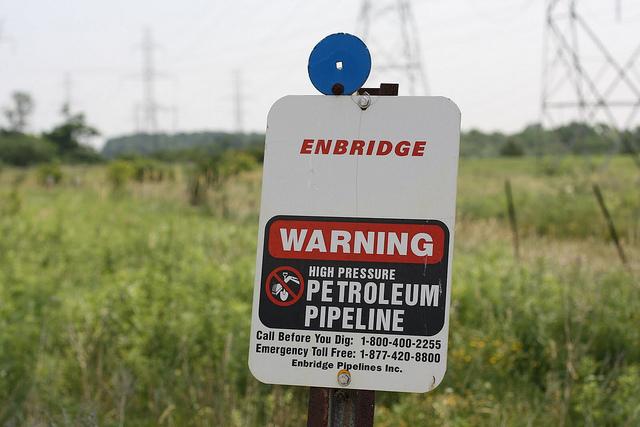The proposed expansion of the Enbridge Line 61 pipeline is a dangerous and irresponsible proposal that has been skirted around the Wisconsin public without much discussion.
Enbridge Incorporation, one of Canada’s top exporters of crude oil, plans to increase the capacity of its pipeline that runs through Rock, Portage and Dane counties. This would increase the amount of tar sands that pass through the pipeline to 1.2 million barrels a day, a much greater amount than the proposed Keystone XL pipeline — a proposal President Obama promises to veto — would have carried.
The problem with carrying such a great capacity is that doing so significantly increases the risk associated with the pipeline. The potential for a catastrophic spill might seem unlikely, but the residents of Michigan would probably say otherwise. In 2010, a pipeline owned and operated by Enbridge burst and spilled oil into Talmadge Creek, an offshoot of the Kalamazoo River. The spill resulted in the largest inland oil spill in U.S. history, as an estimated 843,000 gallons dumped into the waters of Michigan.
It would be difficult to brag about Wisconsin’s rich tradition of environmental leadership and conservation amendments if a Kalamazoo “take two” were to occur here. In addition to ignoring the risk of a spill, big oil companies often fail to see the even bigger picture. Yes, oil spills are tragic, but the long-term consequences of this fast-paced oil extraction by Enbridge and companies alike constitutes a far more dangerous reality.
In 2010, to stave off global warming, the United Nations established a world temperature threshold of 2 degrees Celsius (3.6 degrees Fahrenheit) above pre-industrial levels that must not be exceeded. In setting this limit, the UN was not trying to reverse climate change, but minimize its impact. However, recent studies show that to stay within the threshold we can only extract certain percentages of fossil fuels reserved in specific areas of the world. According to the proposed model, there are some reserves that simply should not be tapped at all. One area of particular interest is Canada. Under this model, 99 percent of Canadian oil sands are rated as un-burnable. While emissions continue to rise, we are already at least halfway to the 2-degree limit. Enbridge wants to start pumping more than a million gallons of oil every day through Wisconsin even though it is almost certain to surpass the 1 percent extraction limit that we are allowed to burn. Therefore, by allowing this increase in capacity for Line 61, we are allowing the process of global warming to take its course.
These decisions are being pushed under Gov. Scott Walker who is no pioneer in the fight for environmental sustainability. Recently, the passage of a mining bill authorized the construction of what could be the world’s largest open-pit mine located in Penokee Hills in Anderson, Wis. This project has raised serious concerns about the pollution runoff coming from the mine. With the construction of mega-projects like these, we are familiar with the rhetoric of “creating jobs” and “stimulating the economy.” Limiting job opportunities in the name of environmental stewardship is unconventional and will have drastic impacts on the future of our state. Creating jobs at the expense of degrading the quality of life is not a solution, but rather a temporary fix of the high unemployment rates in certain counties across the state.
It is time we quit undermining threats on environmental wellness and climate change. The risks are too substantial and the effects are irreversible. I understand the global demand for oil, but the only time production of these reserves will stop is when the world is baked to a crisp. Until then, I suggest we be smart about where and how we choose to extract our oil. Our grandchildren will sure appreciate it.
Jason Snyder (jsnyder5@wisc.edu) is a sophomore with an undecided major.


